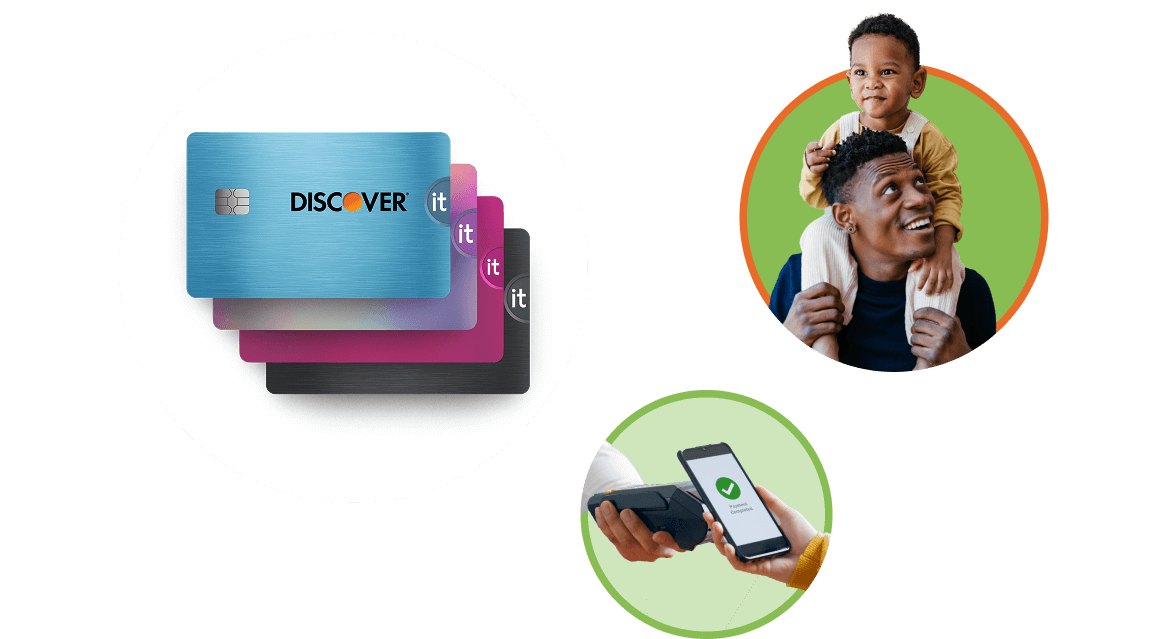Action required: Update your browser
We noticed that you're using an old version of your internet browser to access this page. To protect your account security, you must update your browser as soon as possible. You'll be unable to log in to Discover.com in the future if your browser has not been updated. Learn more in the Discover Help Center
-
Credit Card Products
-
![Discover it Cash Card Art]()
- Discover it® Cash Back Earn cash back rewards
-
![Discover it Student Cash Card Art]()
- Discover it® Student Cash Back Start building credit in college
-
![Discover it Student Chrome Card Art]()
- Discover it® Student Chrome Earn restaurant & gas rewards as a student
-
![Discover it Secured Card Art]()
- Discover it® Secured Build or rebuild your credit
-
![Discover it Miles Card Art]()
- Discover it® Miles Explore with the travel rewards credit card
-
![Discover it Chrome Card Art]()
- Discover it® Chrome Earn restaurant & gas rewards
-
![Discover it NHL Card Art]()
- NHL Credit Card Represent your team & earn cash back
-
Discover it® Balance Transfer Offer
Our lowest intro APR on balance transfers and purchases
Get 0% Intro APR† for 15 months on purchases and balance transfers; then 18.24% to 27.24% Standard Variable Purchase APR applies. 3% Intro Balance Transfer Fee until June 10, 2025 and up to 5% fee for future balance transfers.

How can balance transfer offers help you?

If you transfer a balance from a high-interest credit card to a Discover Card with an introductory 0% APR balance transfer offer, you can use the money you save on interest charges to pay down your debt.
When you consolidate all your higher-rate credit card debt--or other outstanding debts--with a Discover balance transfer offer, you end up with a single monthly payment and may reduce how much you pay in interest in the long run. Instead of making multiple payments to different debts every month, you can now make a single lump payment every month to Discover and pay down your consolidated debt.
How to choose the best balance transfer
credit card offer
If you're planning to take a credit card balance transfer for debt consolidation, there are three important factors to look for. Compare these three offer areas from each credit card issuer to find the best balance transfer offer for your debt.


A good balance transfer offer should have an intro APR that is a lower interest rate than what you pay on your current debt. Compare offers to see which has the longest intro rate period before your balance converts to a regular APR: once the intro period ends, you'll be subject to a standard interest charge on any remaining balance.


Some balance transfer credit card offers have a balance transfer fee, so it’s important to consider that as part of the cost of a balance transfer, even if the balance transfer comes with a low APR. But it’s also important to remember that when you open a new credit card by taking a balance transfer offer you’re opening a financial account that you can use beyond the terms of the balance transfer. That’s why it’s a good idea to check what other credit card fees might be applied to different kinds of transactions or to keep the account open year after year. Discover credit cards have no annual fee, but that’s not true for all credit cards issuers who have balance transfer offers.
* Intro purchase APR is 0% for 15 months from date of account opening then the standard purchase APR applies. Intro Balance Transfer APR is 0% for 15 months from date of first transfer, for transfers under this offer that post to your account by June 10, 2025 then the standard purchase APR applies. Standard purchase APR: 18.24% variable to 27.24% variable, based on your creditworthiness. Cash APR: 29.24% variable. Variable APRs will vary with the market based on the Prime Rate. Minimum interest charge: If you are charged interest, the charge will be no less than $.50. Cash advance fee: Either $10 or 5% of the amount of each cash advance, whichever is greater. Balance transfer fee: 3% Intro fee on balances transferred by June 10, 2025 and up to 5% fee for future balance transfers will apply. Annual Fee: None. Rates as of March 31, 2025. We will apply payments at our discretion, including in a manner most favorable or convenient for us. Each billing period, we will generally apply amounts you pay that exceed the Minimum Payment Due to balances with higher APRs before balances with lower APRs as of the date we credit your payment.


Does the credit card company offer cash rewards on purchases, or a welcome bonus reward to new cardmembers? Are you able to redeem the rewards in ways that are valuable to you? What kind of customer service does the card issuer provide? Look for these details, as well as security features and benefits that make the card one that you’ll keep and use beyond the balance transfer. The longer you have and use an active credit card account responsibly, even if it’s one that you originally opened for a balance transfer, the more that account can influence your credit report and credit score.
Get a Discover Card balance transfer offer


Where can you find a balance transfer offer?
You may find balance transfer offers when you consider opening a new credit card account. In other cases, an existing credit card account might give you a balance transfer offer to use with your current line of credit. Either way, it’s important to know that even if you open a new account with a balance transfer offer, you might not always have a balance transfer offer on that credit card account. Card issuers evaluate customer accounts to determine whether a current customer is eligible for a balance transfer offer.
Pay down higher-rate credit card debt and save money on interest
with a low intro APR balance transfer from Discover it® Cash Back Credit Card
No annual fee
* Intro purchase APR is 0% for 15 months from date of account opening then the standard purchase APR applies. Intro Balance Transfer APR is 0% for 15 months from date of first transfer, for transfers under this offer that post to your account by June 10, 2025 then the standard purchase APR applies. Standard purchase APR: 18.24% variable to 27.24% variable, based on your creditworthiness. Cash APR: 29.24% variable. Variable APRs will vary with the market based on the Prime Rate. Minimum interest charge: If you are charged interest, the charge will be no less than $.50. Cash advance fee: Either $10 or 5% of the amount of each cash advance, whichever is greater. Balance transfer fee: 3% Intro fee on balances transferred by June 10, 2025 and up to 5% fee for future balance transfers will apply. Annual Fee: None. Rates as of March 31, 2025. We will apply payments at our discretion, including in a manner most favorable or convenient for us. Each billing period, we will generally apply amounts you pay that exceed the Minimum Payment Due to balances with higher APRs before balances with lower APRs as of the date we credit your payment.
A balance transfer can even help protect your personal information
You're never responsible for unauthorized purchases on your Discover Card.1
Discover could help you reduce exposure of your personal information online by helping you remove it from select people-search sites that could sell your data. It’s free, activate with the mobile app.2
Get an alert if we find your Social Security number on any of thousands of Dark Web sites.3 Activate for free.

Questions about credit card balance transfers
A credit card balance transfer offer is the terms you receive from a lender that allows you to consolidate debt and transfer a balance–or multiple balances–to a single account. Some factors to consider are the interest rate (APR) for the introductory or promotional period, the standard APR after the intro period expires, the balance transfer fee, and the length of the promo period.
Yes, potential new cardmembers can apply for a Discover it® Cash Back Card and take advantage of a balance transfer offer. This lets you move balances from your existing credit card accounts to a new Discover credit card account.
If you’re already a Discover® Cardmember, you can log in to your account online to see if you have a credit card balance transfer offer available to you to transfer outstanding debt with other companies to your Discover Card.
Review your balance transfer offer to learn how long it takes for your other debts to be moved to your new account. The timing may depend on the status of your debt accounts or the ways that they are paid.
For example, with Discover, an account must be open for 14 days before Discover can begin processing your balance transfer request. After that, most transfers are processed within 4 days.
Once you take a balance transfer offer, you have a set amount of time that the balance is subject to the intro promo APR. That amount of time is defined with the original balance transfer offer. Once that time is up, if you haven’t repaid the transferred amount, it’s subject to the standard APR.
When you originally transfer the balance, you may pay a balance transfer fee. This charge is a percentage of the total transferred balance and is added to your total balance. There may be an intro balance transfer fee for a limited period of time from when the initial balance is transferred, which may be different than the standard balance transfer fee that would be applied to other offers.
For example, if you have $1,000 of debt that you want to transfer to a balance transfer credit card, and the offer includes a 5% transfer fee, that would equal $50. So, the initial amount that you will need to repay on the new credit card is $1,050.
Like many credit card issuers, Discover has a balance transfer fee.
A balance transfer may affect your credit score in a few ways.
When you apply for a new credit card, it triggers a hard inquiry that will show up on your credit report.
When you open a new account and add to the amount of available credit (or total credit line) you have, it may lower your debt-to-credit ratio—as long as you don’t continue to add to the amount of debt that you owe. A lower debt-to-credit ratio–also called your credit utilization ratio–may improve your credit score. On the other hand, if you close an account after you transfer the balance, that too will change your debt-to-credit ratio and may impact your credit.
If you manage your new debt consolidation credit card responsibly, make your payments on time, and pay off all of your outstanding debt, that may also have a positive impact on your credit score.
Yes, a balance transfer credit card offer makes it possible for you to transfer balances from one credit card to another credit card. But it’s important to know that most credit card companies won’t allow you to transfer balances from one of their branded credit cards to another credit card in their own brand.
What happens to an old credit card after a balance transfer depends on several factors.
If the entire balance was transferred to a new card, your old credit card will have a $0 balance. You can then decide if you’d like to keep the card or if you want to close the account. Keep in mind the implications for your credit score if you decide to close the account.
Sometimes, however, you can’t transfer the entire balance of your old card(s) to a new card because the credit limit on your new card may not be high enough. In that case, your old card may still have a balance on it and you should have a plan in place to help pay off that credit card debt as soon as possible.
If you take a balance transfer offer with Discover, you not only get a low intro APR on transferred balances, but you also have a new credit card account that you can use to earn credit card rewards even after you’ve paid off your transferred balance. You can make a single new monthly payment, and you don’t have to pay off the entirety of the balance within a set period of time—but you're expected to make at least your minimum monthly payments as you do with any credit card.
A personal loan is a loan for a specific amount of money to be repaid in a specific period of time with a repayment plan established at the outset. Your monthly payment plan is designed to be a consistent amount every month that, if you adhere to the payment schedule, means your entire outstanding debt is repaid at the end of the loan term.

Learn more about balance transfer credit card offers
A balance transfer credit card offer can help you pay off higher interest rate debt. Understand the tools you need to make a credit card balance transfer work for you.
Learn how balance transfers affect credit score. In this article, Discover analyzes the relationship between balance transfers and your credit score.
These balance transfer FAQs can help you understand what's involved with credit card balance transfers.
You are leaving Discover.com
You are leaving Discover.com and entering a website operated by a third party. We are providing the link to this website for your convenience, or because we have a relationship with the third party. Discover Bank does not provide the products and services on the website. Please review the applicable privacy and security policies and terms and conditions for the website you are visiting. Discover Bank does not guarantee the accuracy of any financial tools that may be available on the website or their applicability to your circumstances. For personal advice regarding your financial situation, please consult with a financial advisor.








